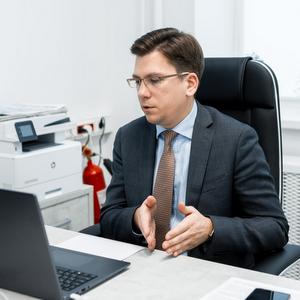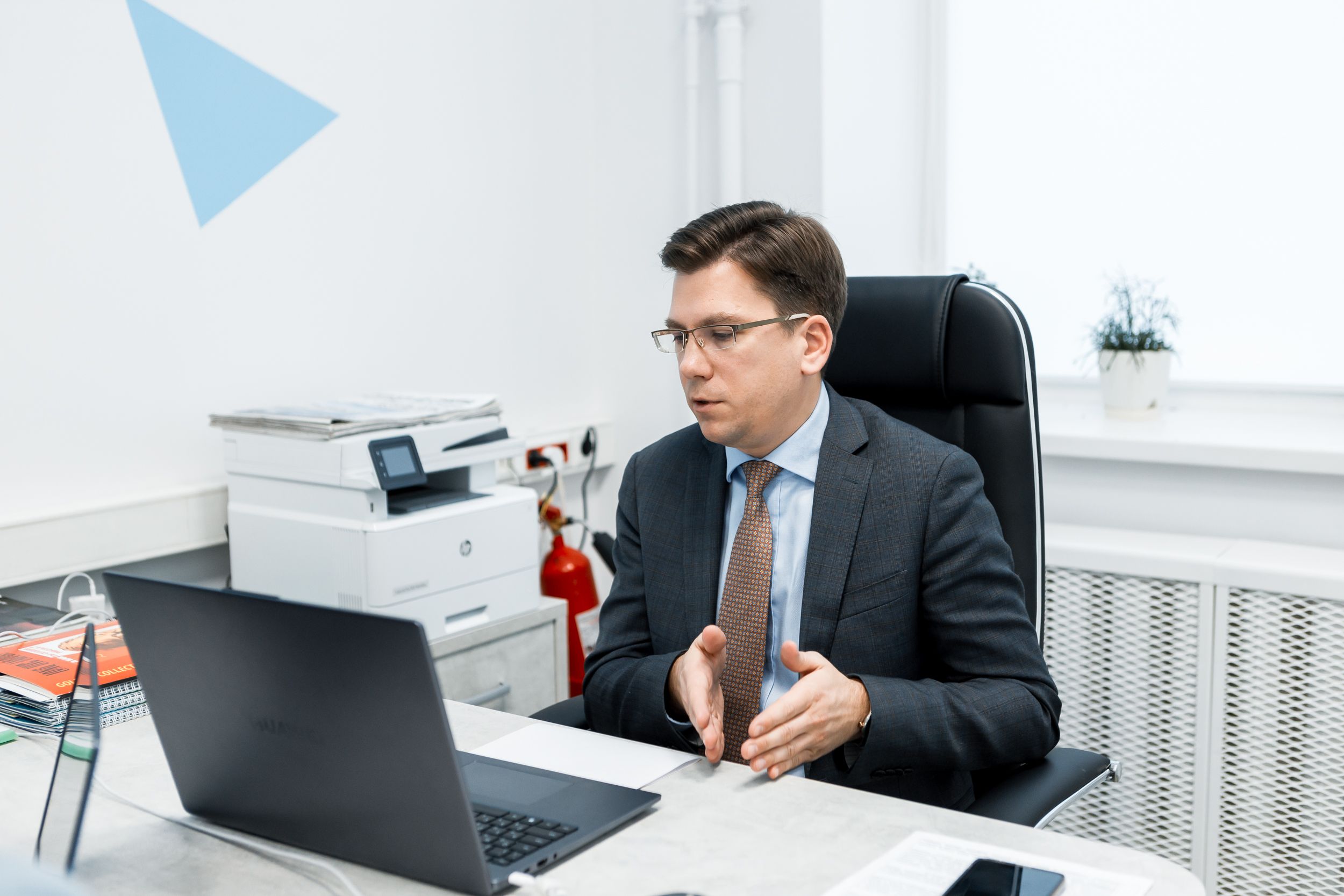Vladimir Bogatyrev, Rector of Samara National Research University, thanked for collaboration and support the industrial partners, including those who directly support the project of the Advanced Aerospace Engineering School: Space-Rocket Centre “Progress” JSC (part of Roscosmos), United Engine Corporation (part of Rostech), its Samara enterprise “UEC – Kuznetsov” PJSC, and “Aviakor – Aviation Plant” JSC. The Rector also reminded the Council members about expanding the pool of industrial partners of the AAES.
“Our Advanced Aerospace Engineering School has a new industrial partner engaged in unmanned aircraft systems, arranging in Tolyatti production of civil-use drones. This is the company “Transport Budushchego”, informed Vladimir Bogatyrev.
Ivan Tkachenko, Director of the AAES, informed the Council members in detail with the applied results that the School had achieved last year in science and education.
Research work was carried out in framework of six themes agreed with industrial partners, the total amount of their financing was almost 100 million rubles. Scientific projects were divided into four groups: strategic, applied, initiative and youth ones.
“Six strategic scientific projects were aimed at implementing the digital-factory concept developed by us; 16 applied scientific projects solved specific tasks in our industrial partners’ interests. Besides, we have formed a track of six initiative scientific projects, which proposed themes for long-term development of the AAES”, explained Ivan Tkachenko.
Six youth projects, in addition to solving specific scientific tasks, have become the basis for new research groups.
“These projects have allowed us to identify and support active youth. And among these researchers, Candidate Dissertations have already been defended, which is also one of the goals of formation and development of the Advanced Aerospace Engineering School”, noted Ivan Tkachenko.
In 2023, significant resources were focused on developing the scientific, industrial and educational infrastructure of the AAES.
Six scientific and production units implementing the digital-factory original concept developed at the AAES have been formed. Among them, two pilot enterprises occupy a special place: the cyber-physical factories of small spacecrafts for the Earth remote sensing (ERS SSC) and small-sized gas-turbine engines (SSGTE), as well as the engineering unit – the digital factory of regional aviation systems and unmanned aerial vehicles.
As Ivan Tkachenko emphasized, despite the fact that the scientific and production infrastructure of the AAES has not yet been completely formed, the researchers have already obtained applied results to be of great importance for industrial partners. Particularly, the prototype of serial automation of the production of 12U cubesats for the Earth remote sensing has been formed. Another very important result is that intelligent production cell (IPC) to be designed to implement the principles of the digital factory in propulsion engineering has been formed.
Last year, 8 interactive complexes for advanced training of engineering personnel appeared in the scientific and educational infrastructure of the AAES. New programs of higher and advanced professional education have been integrated into the learning process.
“We gave the start to 9 new higher education programs to be developed jointly with our industrial partners. Of these, 3 programs are bachelor courses, 6 – master courses. They are aimed at obtaining by students research competencies and those of project managers”, informed Ivan Tkachenko.
At the AAES, in course of training students, special attention is paid to professional internships at enterprises of the aerospace industry and participation in real scientific research. In 2023, 14 master-degree students completed such internships at leading enterprises of the United Engine Corporation (UEC) and the United Aircraft Corporation. Under their mentors’ guidance, 24 master-degree students took part in R&D work on 6 scientific themes.
In total, 250 students currently study at the Advanced Aerospace Engineering School, and the first graduation of engineers of the new formation will take place this year, 2024. The AAES has thought out how to organize employment of its graduates at the most modern level. According to Ivan Tkachenko, in February, in their personal accounts on the electronic resources of Samara University, new options will appear. The AAES graduates will be able to create their CVs, which will be available for their potential employers to see. The students will have access to the list of vacancies, and the University’s HR service will be able to form and track their career trajectories, as well as correlate the demand for available vacancies and the young engineers’ specializations.
The AAES is not just about students. There are 5 additional professional education (APE) programs to have been developed. 10 engineers were trained under the APE Program “Organization and Management of Technological Supply Chains”, 252 academic hours. 98 employees of enterprises and universities (RSC “Progress” JSC, “UEC – Kuznetsov” PJSC, Ural Civil Aviation Plant JSC and a number of others, as well as Moscow Aviation Institute (National Research University), Peter the Great St. Petersburg Polytechnic University and Tolyatti State University) studied under 4 advanced training programs.
“For the Advanced Aerospace Engineering School, not only whom, what and how to teach, but also who teaches is a rather important issue. In 2023, 10 of our employees underwent professional retraining under the Program “Project Management in Terms of Digitalization of Production”, developed by the Foundation “Centre for Strategic Research “North-West””. And in total, 160 employees of the AAES improved their qualifications last year”, informed Ivan Tkachenko.
According to the AAES Director, in 2023, the School fulfilled all indicators set by the Ministry of Education and Science of Russia, and even exceeded some of them with a large margin. In 2024, development of the digital-factory technologies will continue, it is planned to retrofit existing production and educational spaces, found 3 laboratories, as well as start applying 2 higher education programs and a number of APE programs by orders from industrial partners.
Opening the discussion on the report, Academician of the Russian Academy of Sciences Viktor Soyfer, President of Samara University, stressed that close communication with enterprises is one of the University’s long-standing traditions to be currently developed by the Advanced Aerospace Engineering School.
“It is very important for us how satisfied our industrial partners are with our developments, how compatible the developments are with the real conditions of enterprises. It’s actual implementation, resolving specific technical problems facing production, that is our main goal. And if, for example, we understand that the intelligent production cell being developed at the AAES within the theme of small-sized gas-turbine engines will turn into a “brick” for formation of new workshops in the UEC tomorrow, this is a huge achievement”, says the president of Samara University.
Victor Soyfer also noted one of key advantages of the AAES approach to education is multidisciplinarity. Each student gains in-depth knowledge and skills within their main specialty, and simultaneously develops competencies in related specialties, obtaining experience of work in the multidisciplinary team.
During the discussion, representatives of the industrial partners directly participating in developing both research and educational programs of the AAES, highly appreciated the level of developments being carried out in their interests.
For example, Evgeny Kosmodemyansky, Head of the Research and Technical Centre, General Designer of space systems and complexes at the STC company (St. Petersburg), linked the AAES scientific projects with the policy statements of the Roscosmos Management. He noted that today, Russia needs for rapidly expanding its orbital grouping, doing this not point-by-point, not by single spacecrafts, but by dozens and hundreds of them. This requires new approaches that are very hard to be developed directly in production.
“We are aware of necessity for applying the synergistic effect of combining our resources with university science, with its scientific schools, for the purpose of obtaining required results. We have already had such synergy. We need to launch a series of hundreds of spacecrafts, therefore the area, such as digital, cyber physical factories, is very important for us. And in this area, we hope for real results gained by the AAES of Samara University. We see them, feel them, and will use them”, emphasized Evgeny Kosmodemyansky.
His estimation of the AAES activity was supported by Marina Kustova, Development Director of “UEC – Kuznetsov” PJSC.
“Today, we, industrial enterprises, need to respond very quickly and accurately to any changes in demand. Including those when the demand for end products and their components drastically increases. “UEC – Kuznetsov” PJSC understands that digitalization of individual workshops and sites will not settle this difficult problem; only by applying a stack of digital technologies to the entire production chain, we will cope with it. We would like to have Samara University, having formed solutions in conditions of the existing testing grounds – experimental digital and cyber-physical factories and laboratories, to determine like a flagship the fairway, which industrial partners and, in particular our enterprise, will then pass through. It is universities, which integrated technologies can be worked out in, making it possible to obtain the final result – production expansion required”, stressed Marina Kustova.
Samara University schedules to report to the Ministry of Education and Science of Russia on results of implementation of the Federal Project “Advanced Engineering Schools” for 2023 in February.
For reference:
The AAES infrastructure in progress:
1) arranging 3 key research and production units implementing the digital-factory concept is being completed:
- Cyber-physical factory of small spacecrafts;
- Cyber-physical factory of small-sized gas-turbine engines;
- Digital factory of regional aviation systems and unmanned aerial vehicles.
- Laboratory of the industrial Internet of Things;
- Educational and research Laboratory of designing and production testing of the payload of small spacecrafts for the Earth remote sensing (ERS SSC);
- Laboratory of intelligent enterprise management systems.
- Digital additive technologies;
- Robotics and mechatronics;
- Digital engineering of technological processes;
- Immersive technologies in propulsion engineering;
- System engineering of unmanned aviation systems;
- Organization and optimization of production processes;
- Computer engineering and digital technologies;
- VR technologies.
In 2024, it is planned to:
1) organize 3 laboratories:
- Industrial Robotics Laboratory;
- Laboratory of Electronics and Cybernetics;
- Free-Space Optical Communication Laboratory.
- Advanced Technologies for Manufacturing Aerospace Engineering Products (Bachelor’s degree);
- Aerospace Engineering and Technology (Master’s degree).


